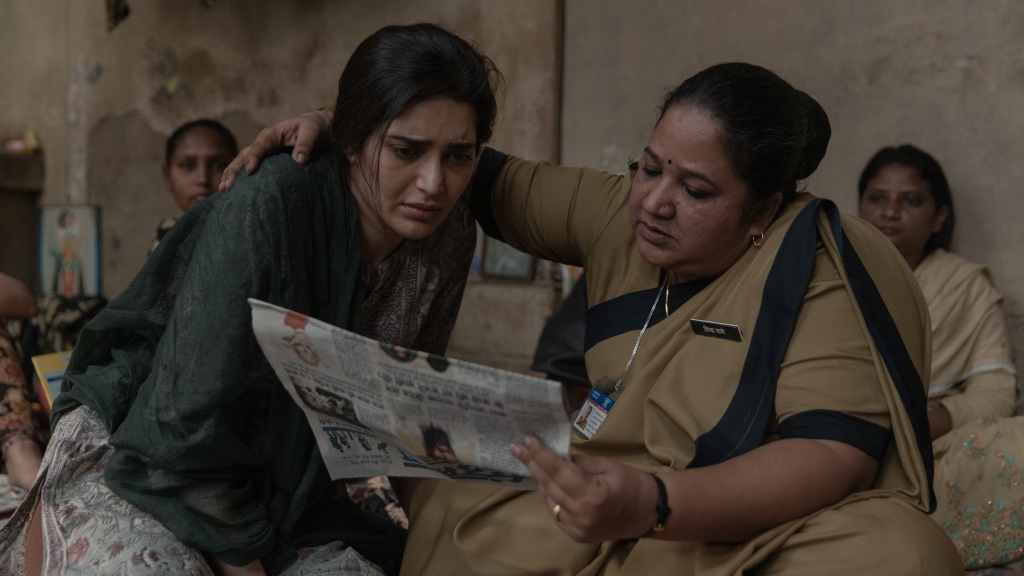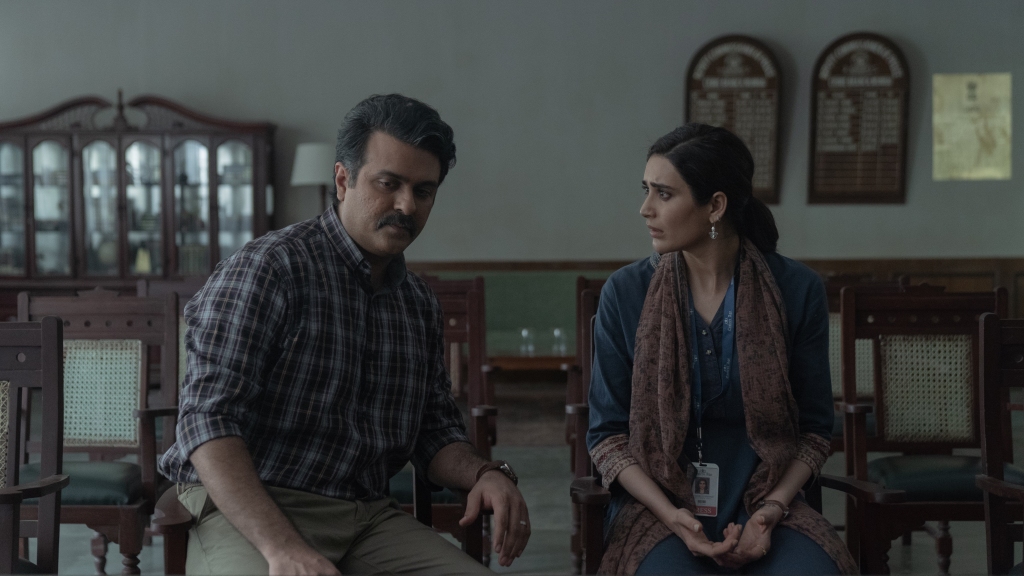[ad_1]
Based on controversial journalist Jigna Vora’s book Behind Bars in Byculla: My Days in Prison, director Hansal Mehta, writer Mrunmayee Lagoo Waikul’s Netflix series finely examines the good, bad and the ugly of crime journalism.
Rating: ⭐️⭐️⭐️ (3 / 5)

By Mayur Lookhar
“If I remain out of sight, I’ll be out of mind. Be out of my mind, and you could soon be out of job,” says a worried Jagruti Pathak. The single mother is out on a long due vacation but her mind is fixed on news stories. That’s life for a journalist. Or at least the successful ones who are thinking 24×7 about bylines, the next big exclusive story. Pathak’s byline fixation stems more from the fear of competitors stealing the march over her. Do hundreds of exclusives, yet chances are that your editor will haul you for the odd big story that you missed.
Although a humble entertainment journalist, this reviewer has been through his phase of exclusives, breaking news, and bylines. In journalism, your biggest competitor isn’t your rival publication(s), but often it’s the immediate colleagues. We recall experiencing those 24×7 byline anxieties. One-upmanship is fine, but here the once indebted-colleagues didn’t flinch in literally walking over your dead body to achieve their selfish goals. It hurt then but years later, you accept that more than any colleague/competitor, it was your own ego, insecurity that hurt you the most. This reviewer hasn’t touched the career peaks. Hey, but neither has he endured a hellacious time like Jigna Vora.
The former noted crime journalist made headlines after she was arrested for allegedly tipping off mafia on the whereabouts of competitor Jyotirmey Dey, who was shot dead by four assailants on 11 June, 2011. The initial Crime Branch investigation suspected professional rivalry, and Dey’s bold articles as the probable reason for his murder. Underworld don Chota Rajan was later convicted of plotting to kill Dey.
A byline is of great professional value, but honestly, most readers don’t care much about the reporter. It’s the headline, the story that piques their interest. The very reader and citizens do take notice when you [reporter] move on from the byline to becoming the headline. This happens either when you are awarded, quit journalism or courted a controversy. The cold murder of Dey, the tension, anger in the media fraternity, public at large all pronounced Vora guilty. This reviewer, too, is guilty of it. Media, too, was perhaps polarized. Such stories are ideal for sensationalism for a certain section in the media, chiefly broadcast media.
Vora spent over nine months in jail. The subsequent court verdicts now question the media, public trial. She would pen her horror in Behind Bars in Byculla: My Days in Prison [2019]. It became the basis for Thappad [2020] writer Mrunmayee Lagoo Waikul, Mirat Trivedi and filmmaker Hansal Mehta to tell their drama series Scoop [2023]. Though devoid of star names, Scoop is a gripping crime thriller series that subtly questions alleged police-mafia nexus, political maneuvering and above all, the media/public trial.
The first two are beyond the layman’s processing ability. Media/public trial though is something that needs serious introspection. Mehta’s series has its media trial but he doesn’t go overboard in media bashing.
It’s not the first, and nor will it be the last time when civilians, sensationalists have jumped the gun in a sub-judice matter. In the end, Hansal Mehta’s Jagruti Pathak, [Karishma V Tannaa], nor Jigna Vora is eyeing compensation. There is an acceptance that some way down the line, you became a victim of your own ambitions, brand image, false pride. That is the message for all byline hungry, brand journalists. Be it crime, political, or any beat, in the end, you only grow as much as the industry allow you to. Get off that pedestal. The sooner you smell the coffee, the better the chances of you surviving here. There’s a humanity, humility to Jagruti, but her curiosity got the better of her. What’s that phrase? Curiosity killed the cat. Scoop is a mirror into the good, bad, and the ugly of crime journalism.
Though devoid of star names, Mehta, casting director Mukesh Chhabra have largely picked uncut diamonds to tell this Scoop. Karishma V Tannaa has been around for ages. TV is a never fair assessment of an actor’s potential. It helps to pay your bills, but TV also comes with its stereotypes. Tannaa has spoken about how TV actors are not quite taken seriously by some film casting personnel. Hansal Mehta, though, usually works with actors and not stars.

Jagruti Pathak initially draws you with her hunger for success, confidence, fearless attitude. Be it her success or later her fall from grace, her family stood behind her like a rock. Her childless maternal uncle [played brilliantly by Deven Bhojani] is the strongest pillar. Tannaa’s Jagruti is presented as an aggressive journalist but a woman of fine character. It is very easy for her sources, influential figures to misconstrue her humane, friendly nature. “Before taking any tricky decision, I often think of the impact it would have on my child,” Pathak has ingrained this line in all walks of her life. She’s willing to go the extra mile to source the news, but never will she compromise on her dignity. Be it any profession, a woman rising up the ranks quickly often leads to suspicions/gossip by envious characters.
Naturally, it’s a different Jagruti that we see as her bail plea gets rejected one after another. Once shifted to Byculla jail, it only gets more taxing for the lady. The de-glam look is only a part of the job at hand. Tannaa finely slips into the tumultuous journey of her character. She makes the most of her opportunity in delivering a career-defining performance.
Prosenjit Chatterjee’s Jaideb Sen is soft-spoken. Sen has this tensed look to him. Albeit a cameo role, Chatterjee leaves his footprints in the series.

The surprise package here is Harman Baweja, who is initially unrecognizable as JCP Shroff. Pathak was once his most favoured crime journalist. Professional equations though don’t count much when the weather is rough. Baweja’s Shroff is classy yet shrewd. The forlorn actor gives a reminder that if he given the right opportunity, he can do justice to it.

Apart from her family, the one man who forever backed Pathak to the hilt is editor Imran Siddiqui [Mohammed Zeeshan Ayyub]. The naturally gifted actor has this languid elegance to him. As an idealistic, ethical, publication, The Eastern Age would have egg on its face if it chooses to side with an accused that is one of their own. Imran’s conviction about Jagruti’s innocence stems from a strong working relationship. He backs her but once the 5Ws, 1H look distant, the man is compelled to abide by the management. He resigns from his coveted post. Such upheaval often presents plum opportunies for others. Like his director, Ayyub can divide opinions with his political views, but there’s never any doubt over his talent. Ayyub ‘s act is a sheer tour de force.

Speaking of opportunism, the one to feast on Pathak’s misery is Deepa Chandra [Inayat Sood], the woman who was once an under-study to Jagruti. You curse Deepa for her impetuosity, but have to admire the convincing act young Sood.
Each and every other artiste is a fine pick. The unheralded Ravi Mahashabde is menacing as the no-nonsense investigating officer Jagtap. Phew, a viewer too is likely to feel nervy watching him interrogate Pathak and others. Jaimini Pathak, another unheralded artiste, is flawless as the high-profile advocate Vashisht who takes up the Jagruti Pathak case much later.
Any web series’ success hinges on the opening episode, and more precisely, its first 20-30 minutes. We found engagement only through the final 15-20 minutes of the opening episode. Once it picks momentum, you are glued to Scoop. Maybe, the penultimate episode felt a drag, appearing to be emphatic to Jagruti’s hellacious time in jail. We’re not being insensitive, but in a story like this, a viewer is restless in knowing the reasons, evidence that will prove Jagruti’s innocence or culpability.
Hansal Mehta, Waikoo Lagoo are justified in showing the impact that a dark chapter has on the lives of family members of the accused. Jagruti’s family consists of her nana ji [maternal grandfather], mother and a 10-year-old son who is studying in boarding school. Often in our rage, society tends to crucify family members too. Jagruti’s poor son ran away from the school after learning of his mother’s plight. Thankfully, he is found. For a young boy, he later shows great resolve which goes a long way in boosting the sagging spirit of Jagruti.
Scoop is a series based on Jigna’s Vora’s life. Naturally, bulk of the story is told through her perspective. There is very little perspective though of Jyotirmoy Dey’s family members. How did Dey’s widow Shubha, his mother perceive the entire case, and the allegations against Jigna Vora? The wife does turn up in the crucial final episode, but it would have been nice to tap into the turmoil that the family faced after the death of J Dey.
Scoop scores well on the technical front with deft cinematography, neat production design and an intense, entertaining theme by Achint Thakkar.
Hansal Mehta divides opinions with his political views. He, however, doesn’t impose them on his films, often giving us a balanced perspective of the serious stories. Ironically, there is a stunning right-wing savior in the Jagruti Pathak story. Oh, is Hansal Mehta shifting side? Nah, he’s smart in reminding us that all social, political powerful figures never do anything for free.
Scoop urges the society to not jump the gun in any case. One can’t compare the injustice done to Vora with other criminal cases involving journalists. The closing montage (photos) of other missing/dead journalists suggests that Mehta, Waikoo Lagoo have perhaps formed a certain opinion. Each case has to be studied. Each case has its own dynamics, pros and cons. Media, Press Clubs shouldn’t jump to any fellow member’s defense or ridicule one without understanding the merits/demerits of a case. There should be unanimity in one thing though – let’s not pass verdicts before an innocent is proved guilty by law.
The media, public trial only adds pressure on the authorities for a quick fix. Often such probes look for scapegoats. What’s done can’t be undone. But this ignorant entertainment reviewer certainly owes an apology to Jigna Vora, her son and family. We can only hope that the late J Dey and his family has got or gets true justice. Do we even qualify to comment on any case further? The series does put the spotlight on the mandarins involved in the J Dey murder case. We fear that one particular person’s rumoured biopic might need a rethinking.
Scoop [2023] is streaming on Netflix.
[ad_2]
Source link














